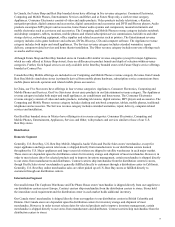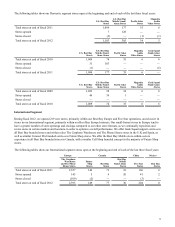Best Buy 2012 Annual Report Download - page 16
Download and view the complete annual report
Please find page 16 of the 2012 Best Buy annual report below. You can navigate through the pages in the report by either clicking on the pages listed below, or by using the keyword search tool below to find specific information within the annual report.16
Failure in our pursuit or execution of new business ventures, strategic alliances and acquisitions could have a material
adverse impact on our business.
Our growth strategy also includes expansion via new business ventures, strategic alliances and acquisitions. Assessing a
potential growth opportunity involves extensive due diligence. However, the amount of information we can obtain about a
potential growth opportunity may be limited, and we can give no assurance that new business ventures, strategic alliances and
acquisitions will positively affect our financial performance or will perform as planned. The success of these growth
opportunities is also largely dependent on the current and future participation, working relationship and strategic vision of the
business venture or strategic alliance partners. Integrating new businesses, stores and concepts can be a difficult task. Cultural
differences in some markets into which we may expand or into which we may introduce new retail concepts may result in
customers in those markets being less receptive than originally anticipated. These types of transactions may divert our capital
and our management's attention from other business issues and opportunities. Further, implementing new strategic alliances or
business ventures may also impair our relationships with our vendors or strategic partners. We may not be able to successfully
assimilate or integrate companies that we acquire, including their personnel, financial systems, distribution, operations and
general operating procedures. We may also encounter challenges in achieving appropriate internal control over financial
reporting in connection with the integration of an acquired company. If we fail to assimilate or integrate acquired companies
successfully, our business, reputation and operating results could suffer materially. Likewise, our failure to integrate and
manage acquired companies successfully may lead to impairment of the associated goodwill and intangible asset balances.
Failure to protect the integrity, security and use of our customers' information and media could expose us to litigation
and materially damage our standing with our customers.
The use of individually identifiable data by our business, our business associates and third parties is regulated at the state,
federal and international levels. Increasing costs associated with information security – such as increased investment in
technology, the costs of compliance with consumer protection laws and costs resulting from consumer fraud – could cause our
business and results of operations to suffer materially. Additionally, the success of our online operations depends upon the
secure transmission of confidential information over public networks, including the use of cashless payments. While we have
taken significant steps to protect customer and confidential information, the intentional or negligent actions of employees,
business associates or third parties may undermine our security measures. As a result, unauthorized parties may obtain access to
our data systems and misappropriate confidential data. There can be no assurance that advances in computer capabilities, new
discoveries in the field of cryptography or other developments will prevent the compromise of our customer transaction
processing capabilities and personal data. Furthermore, because the methods used to obtain unauthorized access change
frequently and may not be immediately detected, we may be unable to anticipate these methods or promptly implement
preventative measures. If any such compromise of our security or the security of information residing with our business
associates or third parties were to occur, it could have a material adverse effect on our reputation, operating results and financial
condition. Any compromise of our data security may materially increase the costs we incur to protect against such breaches and
could subject us to additional legal risk.
Risks associated with the vendors from whom our products are sourced could materially adversely affect our revenue
and gross profit.
The products we sell are sourced from a wide variety of domestic and international vendors. In fiscal 2012, our 20 largest
suppliers accounted for just over 60% of the merchandise we purchased. We generally do not have long-term written contracts
with our major suppliers that would require them to continue supplying us with merchandise. If any of our key vendors fails to
supply us with products or continue to develop new technologies that create consumer demand, we may not be able to meet the
demands of our customers and our revenue could materially decline. Likewise, the formation and/or strengthening of business
partnerships between our vendors and our competitors could directly alter the composition of products and level of customer
purchasing within our stores and online, which could have a material adverse impact on our operating results.
We require all of our vendors to comply with applicable laws, including labor and environmental laws, and otherwise be
certified as meeting our required vendor standards of conduct. Our ability to find qualified vendors who meet our standards and
supply products in a timely and efficient manner is a significant challenge, especially with respect to goods sourced from
outside the U.S. Political or financial instability, merchandise quality issues, product safety concerns, trade restrictions, work
stoppages, tariffs, foreign currency exchange rates, transportation capacity and costs, inflation, civil unrest, natural disasters,
outbreaks of pandemics and other factors relating to foreign trade are beyond our control. These and other issues affecting our
vendors could materially adversely affect our revenue and gross profit.
























